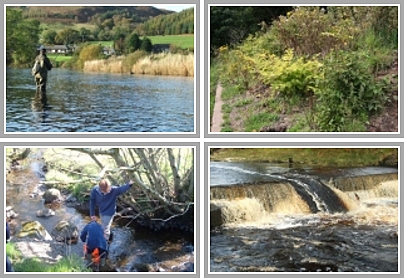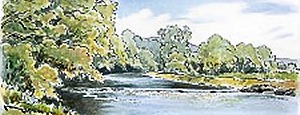
Selfie Time – Struan and Stuart from ART looking rather business like (almost dapper) for a change, outside the Scottish Parliament at Hollyrood
ART were at the Scottish Parliament today to take part in round table discussions that were aimed at making ‘Salmon Conservation a National Priority’.
It was a very positive and well attended meeting with Scottish Government Ministers, MSP’s, The Atlantic Salmon Trust, NASCO, Marine Scotland, DSFB’s, Trusts, SEPA, SNH Scottish Land and Estates and the SSPO all represented.

A packed committee room in the Scottish Parliament where the afternoon debate and presentations ran for 3 hours
While many in the committee rooms were already well acquainted with a host of reasons why our salmon are in rapid decline, this was an opportunity, to highlight the urgent need to make changes that work. Time is running out for salmon and we must all find new ways and more importantly effective ways that work rather than persevering with old strategies and management actions that while not necessarily bad, aren’t bringing about the changes we need.
Based on collected data, MSS and NASCO showed that if the current trend of decline continues across the northern Atlantic ocean, our salmon are facing extirpation in a very few lifecycles unless we find rapid and new way to address the problems they face. In as few as 20 years, unless something changes, we could be witnessing the end of this iconic species. Past management issues haven’t yet found a way to reverse these declines and indeed may have contributed in some ways. The Atlantic Salmon Trust’s CEO Mark Bilsby warned that we all need to up our efforts to find new ways to address the issues.
Now its not all doom and gloom and the Cabinet Secretary for the Environment Rosaeanna Cunningham announced substantial investment (£750K) for tracking west coast salmon smolts today. Understanding where the losses occur is key to finding solutions. Research elsewhere has shown that up to 50% of all salmon smolts fail to make it out of rivers and this is another area that must be addressed and speakers and delegates encouraged Government agencies to allow simpler and less onerous licensing to be implemented and more enforcement of regulations designed to improve water quality and increased. Also required are strategies that increased resilience to climate change.
The iconic salmon species is every bit as valuable as any other species and it is in urgent need of help. That message was clear. Let’s hope that the politicians in the room today take this forwards to their colleagues along with the many other messages that were heard this afternoon and help the sector to find ways to save our Iconic Atlantic Salmon.

Dr Alan Wells summing up the day’s events towards the end of the evening session
In the evening, several Trusts presented posters illustrating much of their recent work to benefit salmon (and trout). ART focussed their posters on our efforts to reduce diffuse pollution and improve water and habitat quality.

ART’s posters detailing recent works
A huge thanks to Alan Wells and colleagues at FMS for putting this event together with Michelle Ballantyne MSP and her colleagues that attended.


Many thanks to ART for attending and highlighting this meeting at the Scottish Parliament
I noticed the Clyde and Lomond system will be part of the smolt tagging project,hopefully at least one of the Ayrshire salmon rivers will be chosen as well
Really interesting that the tagging program on the east coast indicates that 50% of smolts don’t make it to sea,in my opinion that highlights that a lot of fishing clubs should be doing more to ensure these fish get a chance to migrate
I’m a member of a club that’s involved in tree planting along its riverbanks,habitat improvement is crucial,we try our hardest to control invasive species/plants
Most importantly we scare off the many gooseanders and cormorants that are on our river daily
Clubs really need to be more proactive to stop our salmon population reducing year on year